As someone who has studied U.S. college admissions for more than 30 years, I want to share some insights today on Music Pre-College Programs and how they play a surprising role in shaping a student’s path to top universities.
Many of you may know students who attend elite Saturday or full-time music programs such as The Juilliard School Pre-College, New England Conservatory (NEC) Prep, or the Colburn Music Academy. These students are often exceptionally talented musicians. What may surprise you, however, is that even if they do not go on to pursue a conservatory education, they frequently gain admission to some of the most prestigious universities in the United States.
So why do colleges look so favorably upon these students? And how can families strategically leverage Pre-College experiences to strengthen applications? Let’s take a closer look.
Spike and Hook — Building a Unique Strength
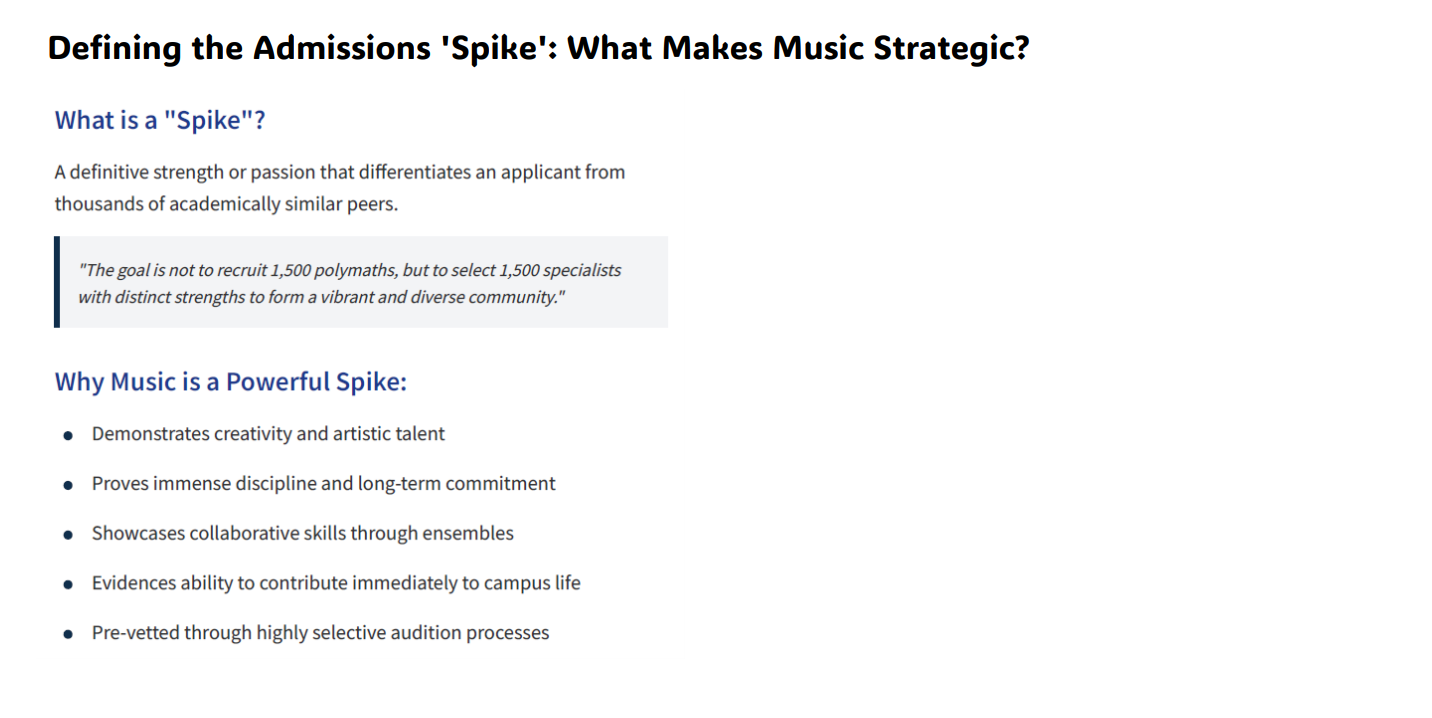
In admissions, two words come up often: Spike and Hook.
-
A Spike is a clearly defined strength that sets a student apart.
-
A Hook is a compelling element that makes an applicant memorable.
Today’s selective universities are not looking for 1,500 students who are “well-rounded in everything.” Instead, they want to build a community of 1,500 specialists who each bring unique strengths.
For music Pre-College students, their “Spike” often includes:
-
Creativity and Artistic Talent – a baseline expectation, but one that distinguishes them nonetheless.
-
Discipline and Self-Control – among the most valued traits in admissions.
-
Collaboration – cultivated through orchestra and ensemble work.
-
Immediate Contribution – the ability to join campus ensembles from day one.
-
Resilience and Stress Management – proven through auditions and competitions.
The Three Types of Pre-College Programs
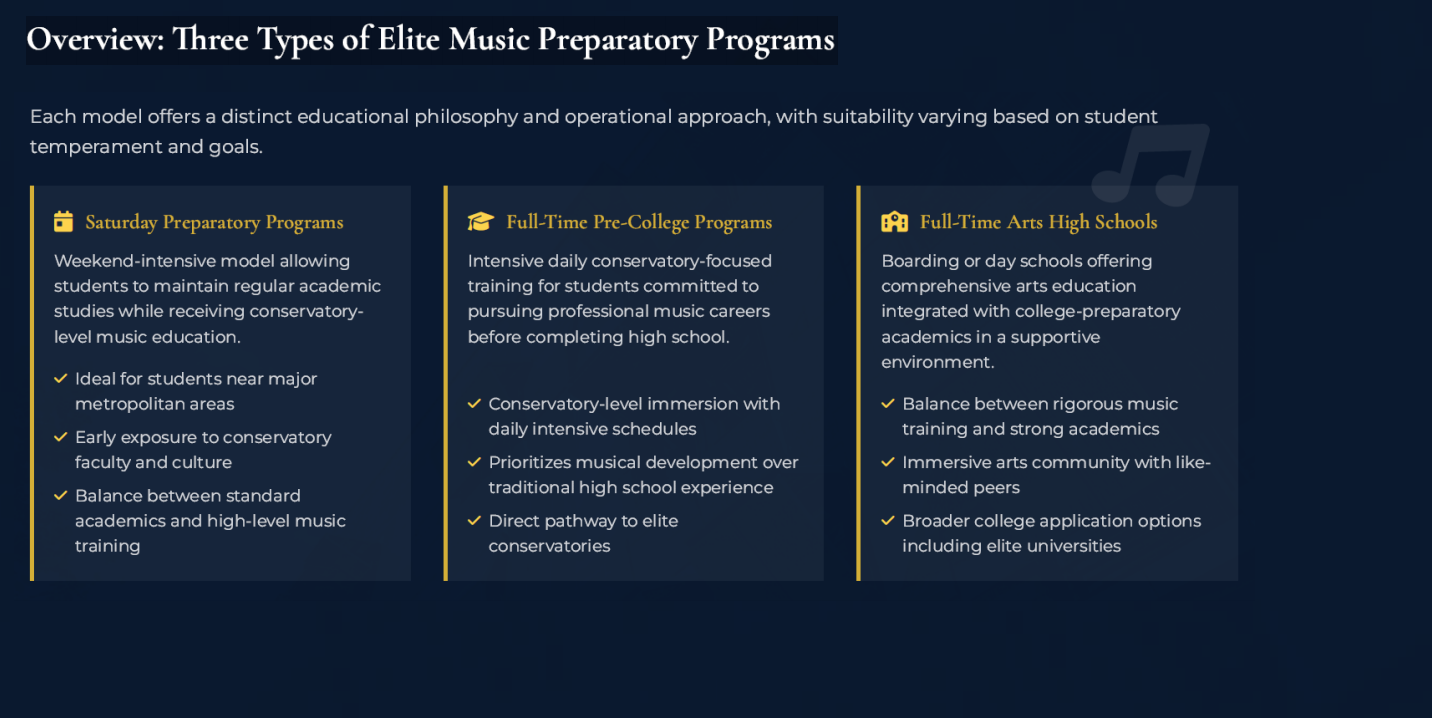
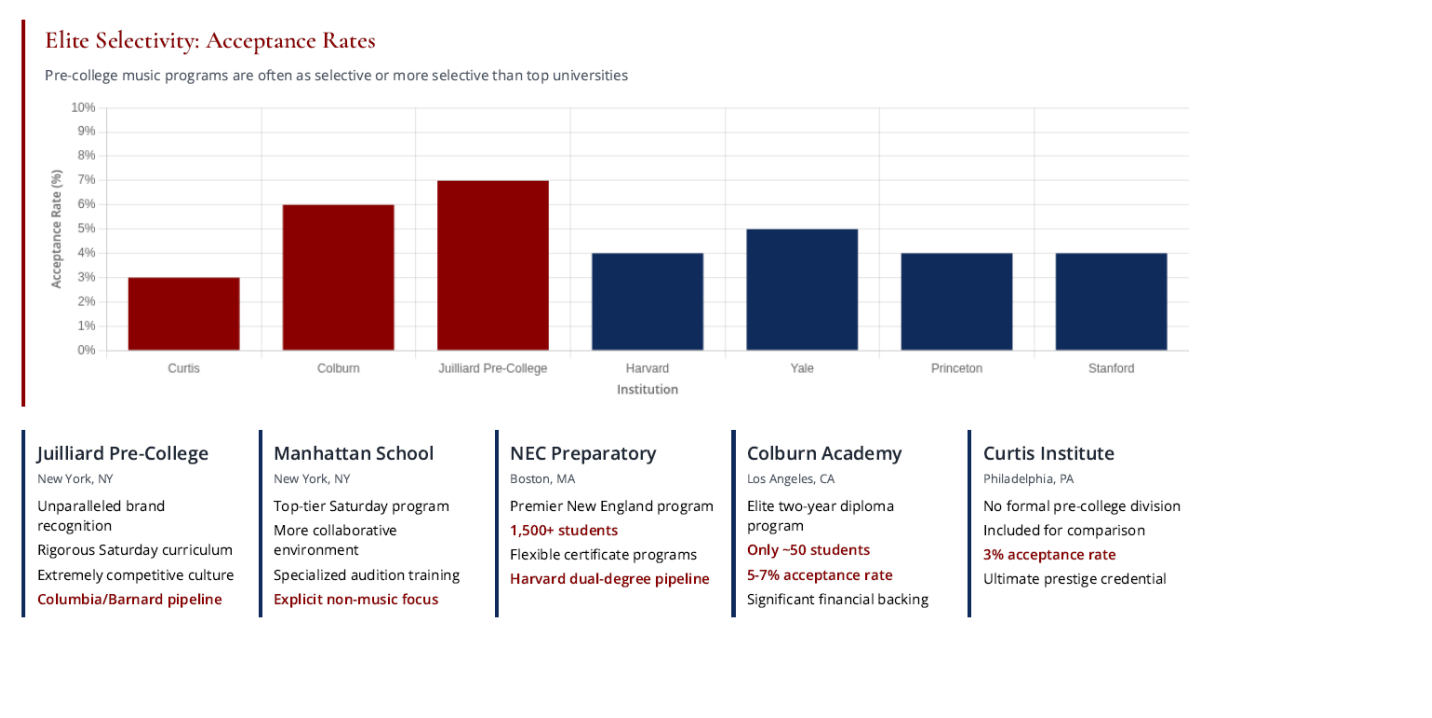
Music Pre-College Programs generally fall into three categories:
1. Saturday Preparatory Programs
This is the most common model. Students attend regular high school during the week, then spend Saturdays immersed in music training.
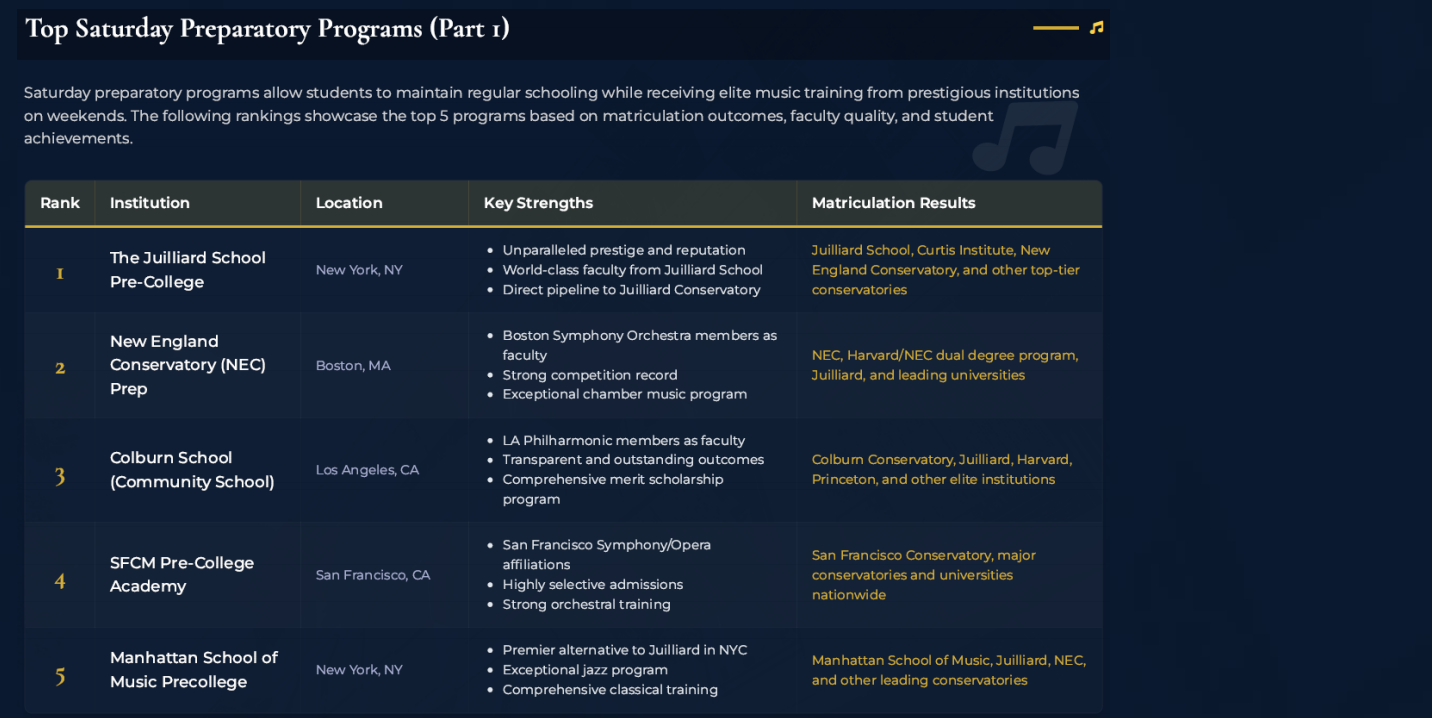
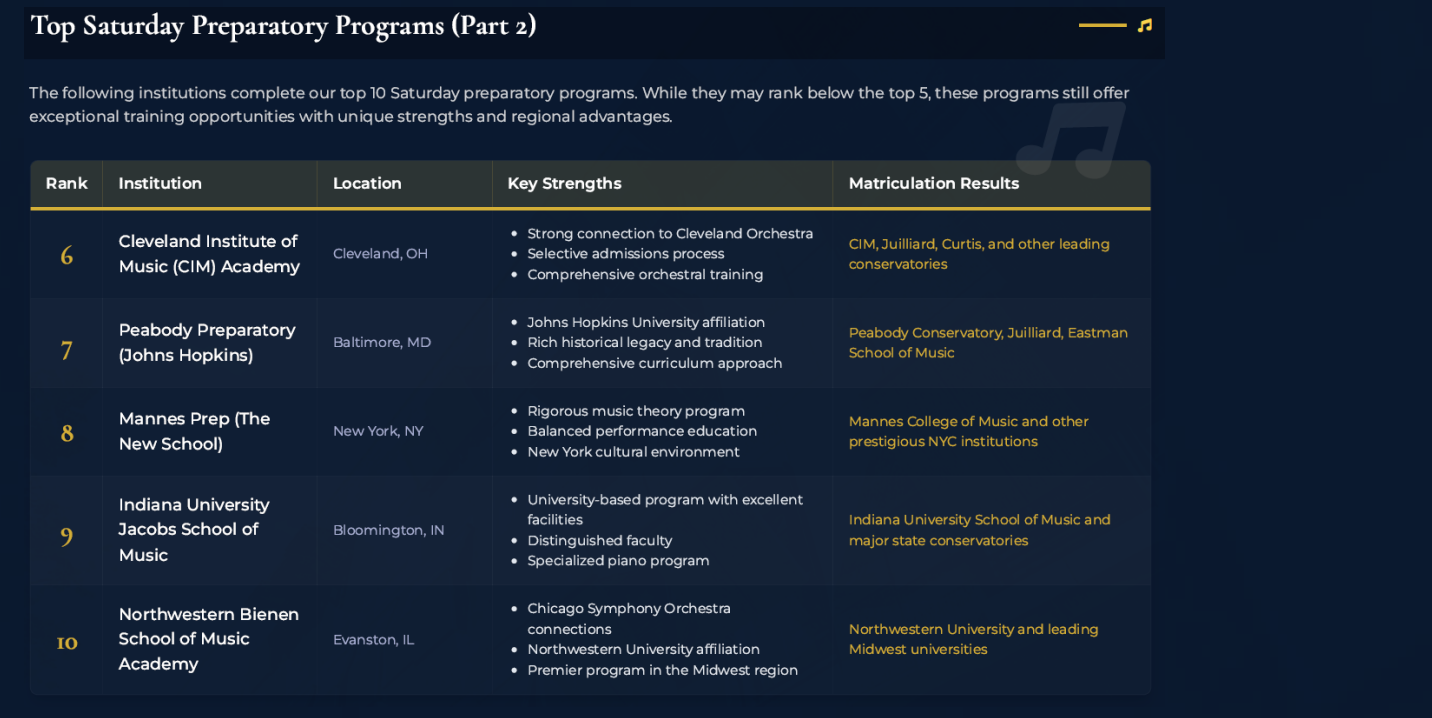
Ranking Highlights:
-
Juilliard Prep – Produces strong candidates for both conservatories and top universities.
-
NEC Prep – Especially strong due to its Harvard/NEC Dual Degree Program.
-
Colburn Prep (Los Angeles) – A premier program on the West Coast.
-
SFCM Prep (San Francisco), Manhattan School of Music Prep, and others like CIM Prep, Peabody, and Mannes are also well-regarded.
The benefit: world-class training. The drawback: many programs do not publish transparent college matriculation data.
2. Full-Time Pre-College Programs
These are intensive, five-day-a-week programs focused entirely on music. Students typically complete their high school diploma through a parallel program.
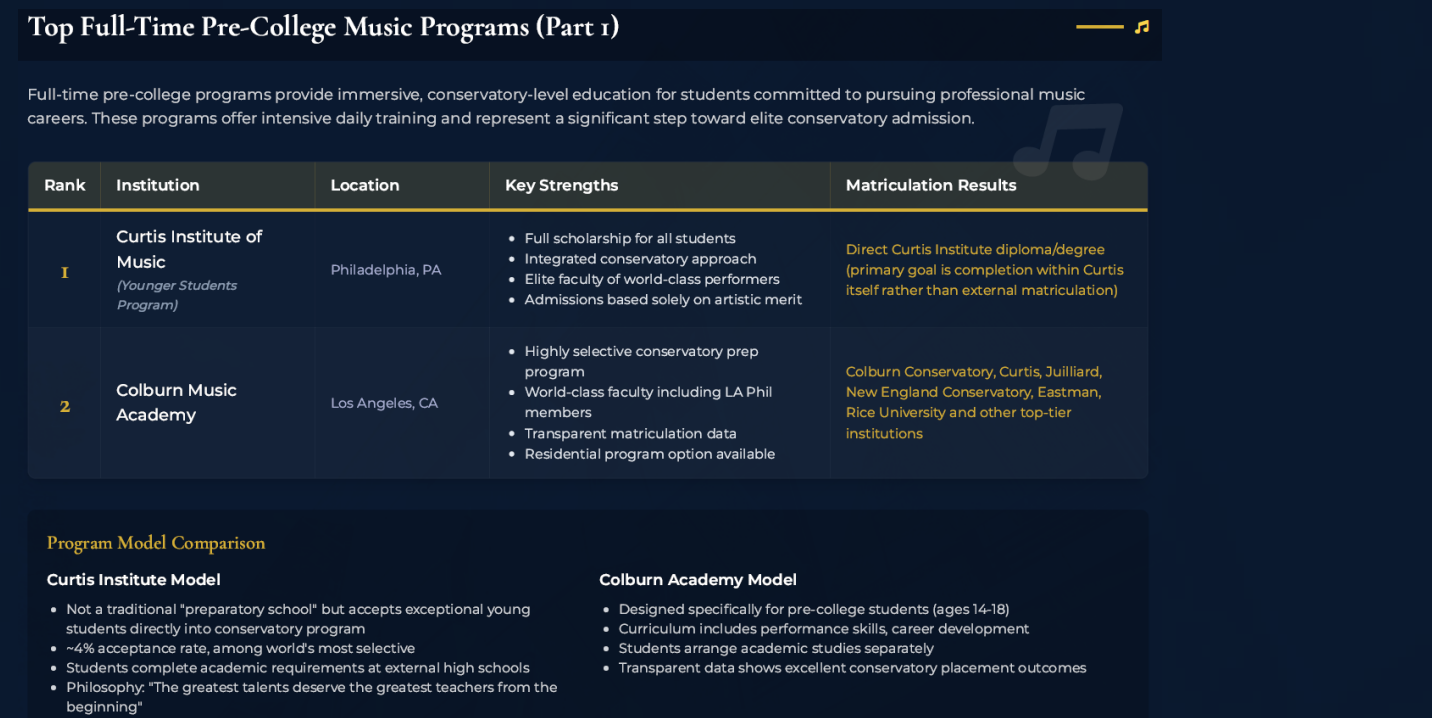
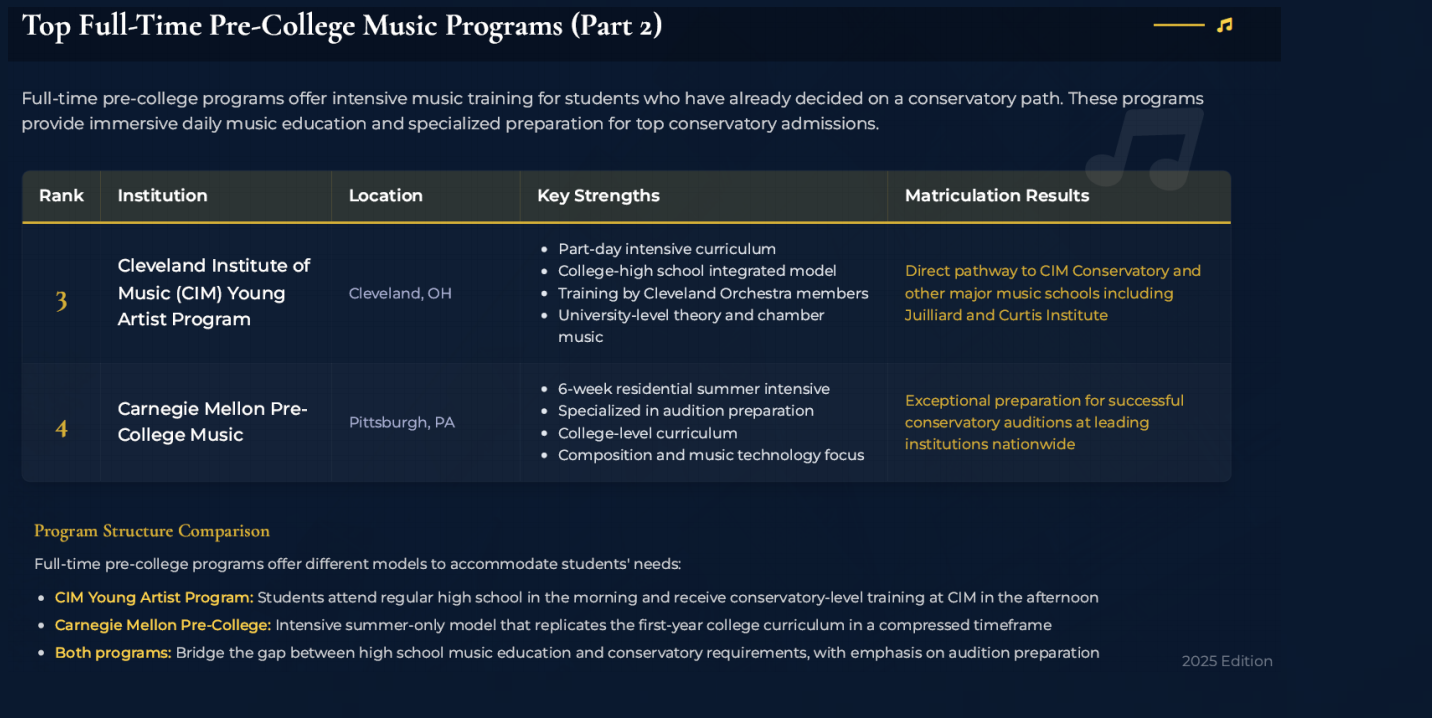 Ranking Highlights:
Ranking Highlights:
-
Curtis Institute of Music – Admission is purely merit-based, with an acceptance rate under 4%.
-
Colburn Music Academy (Full-Time) – Transparent outcomes; students excel in both conservatories and universities.
-
CIM Full-Time and Carnegie Mellon’s 6-Week Program also offer strong training.
3. Full-Time Arts High Schools
These schools integrate academics with professional-level arts training, awarding a high school diploma.
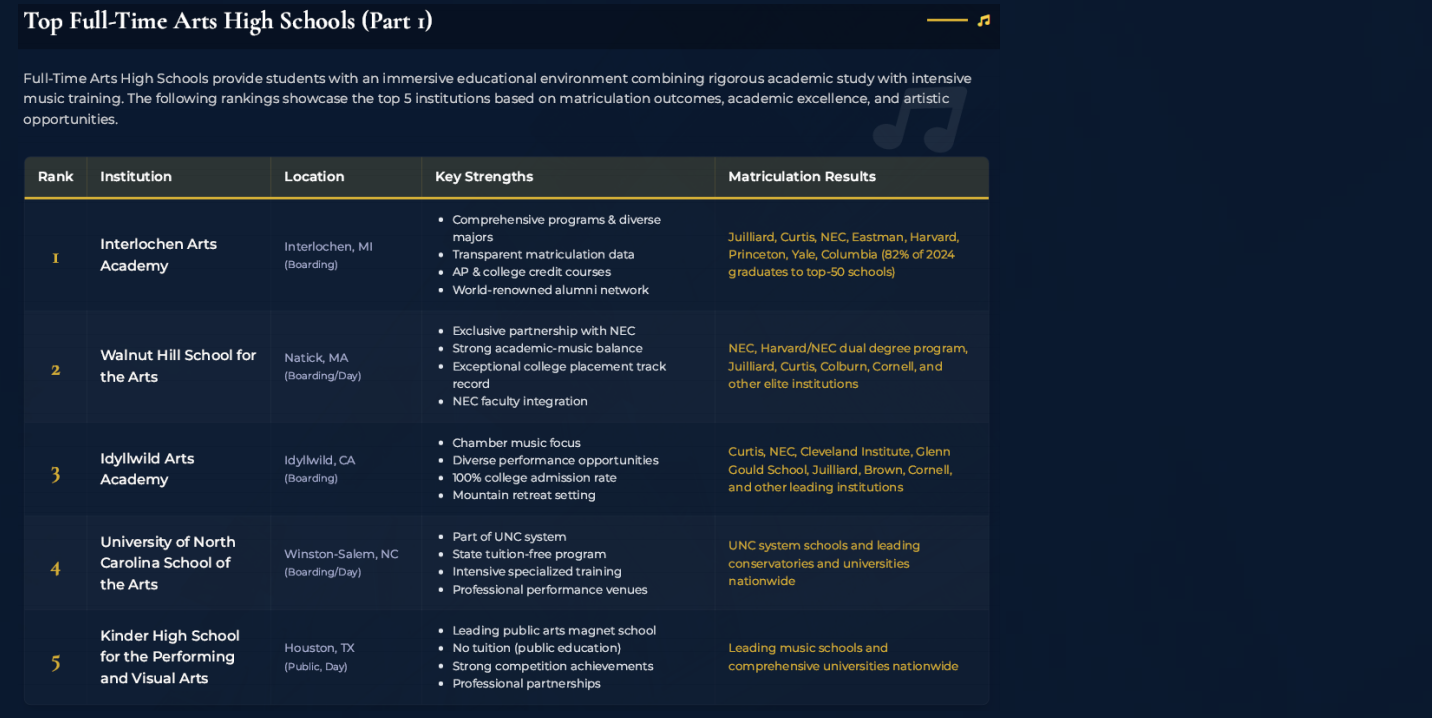
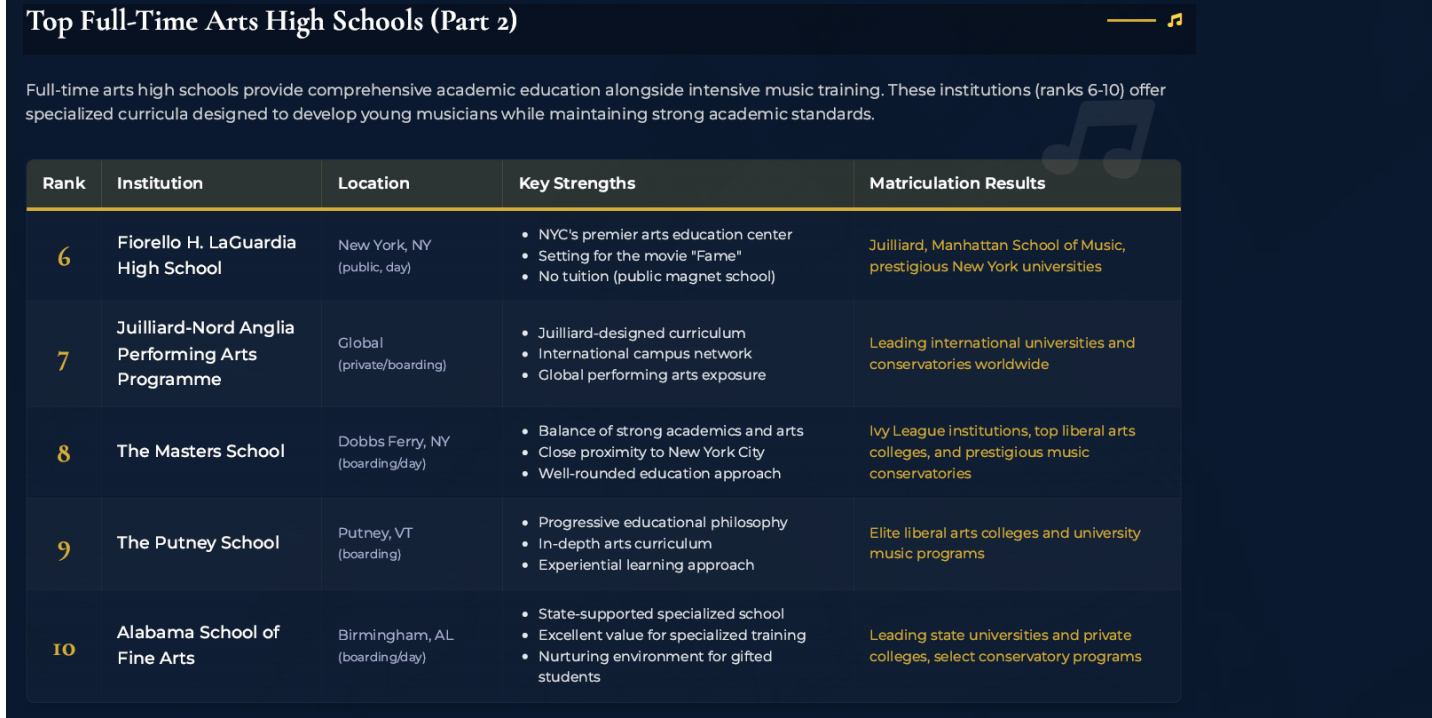
Ranking Highlights:
-
Interlochen Arts Academy – 82% of graduates matriculate to Top 50 universities.
-
Walnut Hill School for the Arts – Strong partnership with NEC and pathways to Harvard/NEC dual admission.
-
Idyllwild Arts Academy and UNC School of the Arts are also notable options.
Art Supplement: High Risk, High Return
One frequent question I hear: Should my child submit an Art Supplement?
The answer: only if their work is truly exceptional. Admissions offices send these submissions to faculty specialists for evaluation, and weak portfolios can hurt more than they help. But for students with competitive Pre-College backgrounds, strong recommendations, and refined recordings, an Art Supplement can be transformative.
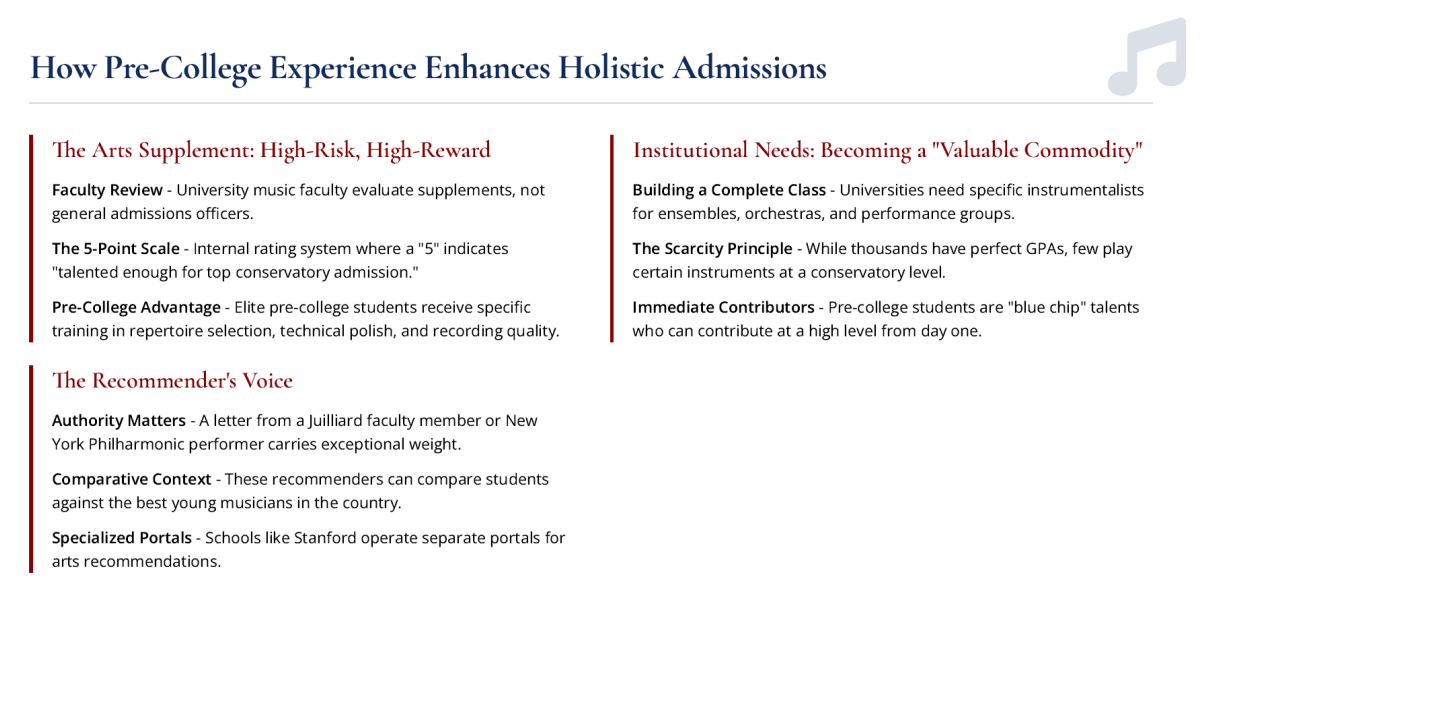
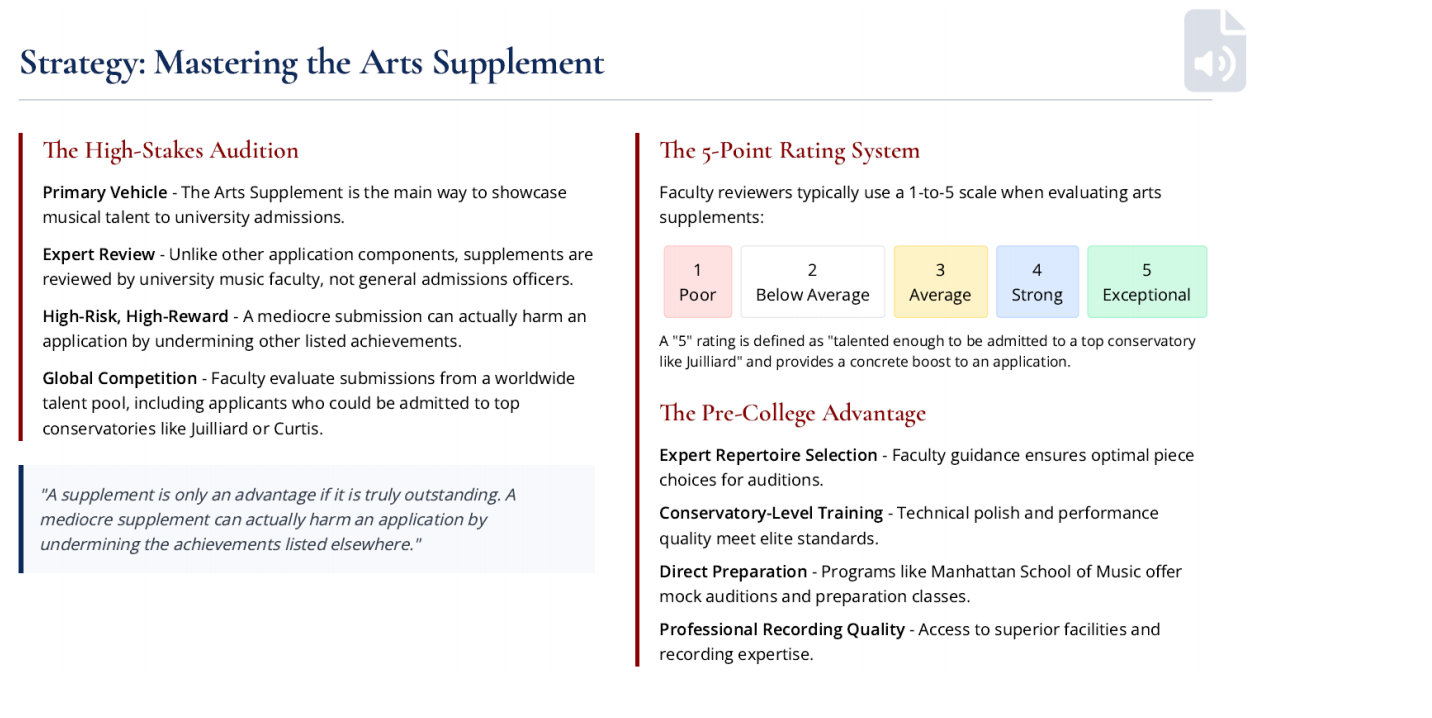
Advantages for Pre-College students include:
-
Prestigious faculty recommendations
-
Proven readiness to contribute musically on campus
-
Recognition as a rare or “needed” instrumentalist
-
Global competition or performance experience
Beyond Music: What Colleges Really Value
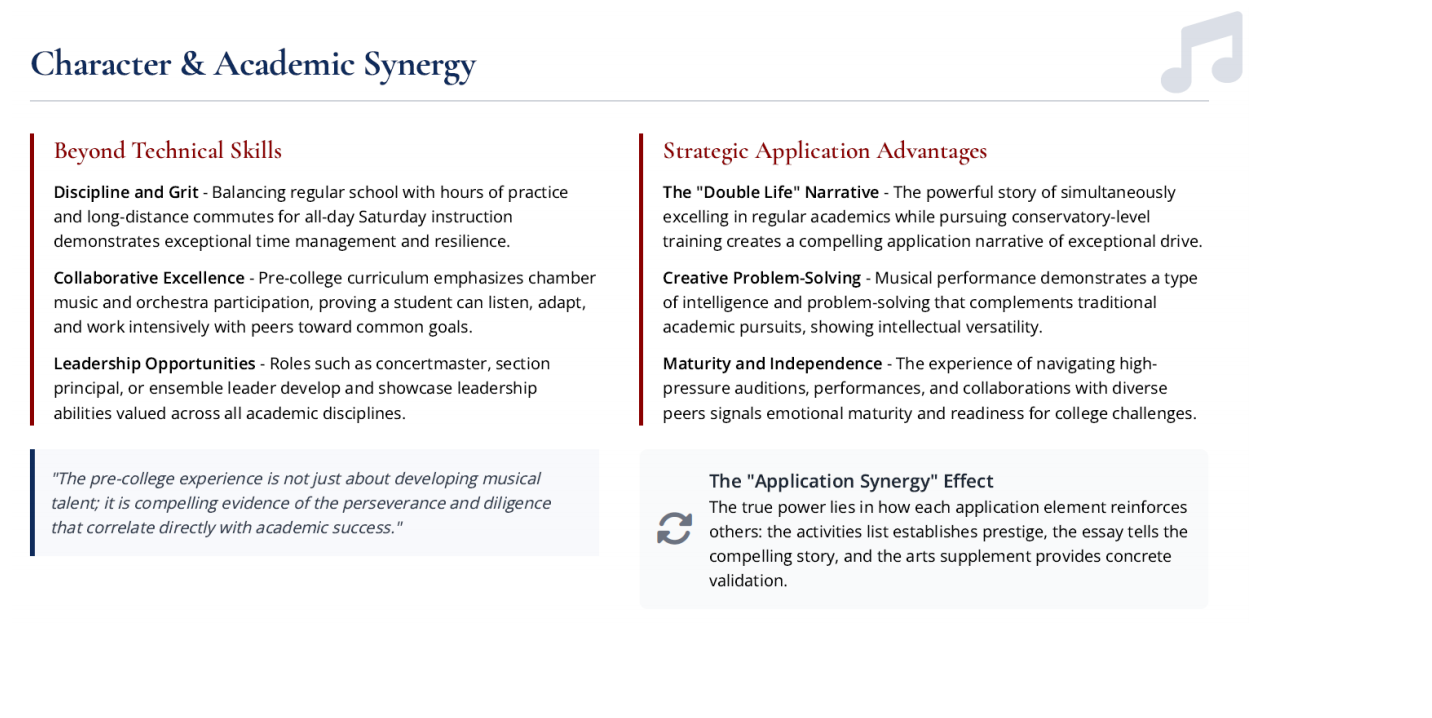
Colleges don’t just admit talent—they admit character. For Pre-College students, three traits stand out:
-
Discipline and Grit – The ability to sacrifice leisure for long-term goals.
-
Collaboration & Leadership – Gained through ensemble roles like concertmaster or section principal.
-
Strategic Narrative & Problem-Solving – The ability to frame their double life—student and performer—as a compelling admissions story.
Case Studies
Case Study 1: The STEM Violinist
A student at Colburn Academy with passions for both music and physics connected his violin practice with problem-solving in computer science. Initially, his “musical scientist” narrative impressed admissions officers. However, for ultra-selective schools like MIT and Stanford, we paired his talents with social-impact projects, such as:
-
Developing vibration-to-LED feedback systems for hearing-impaired concertgoers
-
Using scientific data to enhance concert accessibility
This reframing aligned him more closely with MIT’s mission of “using technology to change the world.”
Case Study 2: The Historian Vocalist
A Manhattan School of Music Pre-College soprano connected her repertoire to literature and history. While strong, this alone was not unique enough for Yale or Columbia.
By expanding her narrative to include cultural preservation, she added depth:
-
Recording traditional Korean and Japanese songs
-
Comparing opera storytelling to oral traditions in folk music
-
Linking these efforts directly to target programs at Yale and Columbia
This combination of artistic excellence and cultural stewardship created a much stronger profile.
Final Thoughts
If your child has the opportunity to attend a competitive Pre-College program, it can be a tremendous asset—not only for conservatory admissions, but also for top-tier universities. The key is integration: connecting artistic excellence to broader academic, cultural, or social narratives.
Yes, music often limits time for other extracurriculars. But with one or two carefully chosen complementary activities, a Pre-College student can stand out even more in holistic admissions.
I hope this guide clarifies how Pre-College experiences can transform into powerful admissions strategies. In future posts, I’ll share additional insights on building narratives for students in specialized fields.
For Digital SAT preparation, I recommend ett-test.com, where you’ll find unique resources including video explanations for every single question.
Thank you for reading, and see you in the next post.
Music Pre-Colloege Programs
US Admission